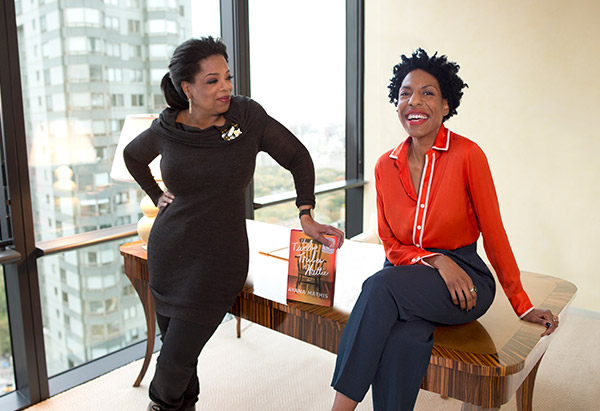Oprah Talks to Ayana Mathis About Her Breathtaking Book, The 12 Tribes of Hattie
Oprah sits down with the author of the visionary new novel she's chosen for Book Club 2.0.

Photo: Rob Howard
Several months ago, I sat down to read The Twelve Tribes of Hattie, the debut novel by 39-year-old Ayana Mathis. It was an advance copy—the book hadn't yet been published. Before I'd even finished the first chapter, I knew I'd found my second Oprah Book Club 2.0 pick. It was The One. This book was so astonishing, it left me speechless.
The novel tells the story of Hattie Shepherd, who leaves Georgia for Philadelphia in 1923. Her 11 children and one grandchild are Hattie's "12 tribes"—whom we meet sequentially in 12 distinct narrative threads. While the paths their lives take are all very different, they share the scars inflicted by a mother who long ago lost the ability to be tender. I went to bed after reading the chapter about Hattie's eldest surviving son, "Lady Boy Floyd," and woke up the next morning thinking Floyd was a real person. The book's ending is the most perfect ever. I was silenced by it. When I finished it, I had to be still for a moment.
Beginning with Ayana's description of Hattie's desperate efforts to save her twin babies, Philadelphia and Jubilee, I was completely with Hattie, in her house in Germantown, Philadelphia. I wanted to know Hattie, to understand her, and to be introduced to everyone in her life.
The book is set against the backdrop of the Great Migration, the nearly six decades starting around 1915, with six million black folk migrating north to escape the terrible hardships of the Jim Crow American South. But there are echoes of Ayana Mathis's own life, too. Her grandparents, with whom she lived from time to time as a young girl while her mother struggled with mental illness, were among those who took part in this exodus to what they hoped would be a kind of promised land. When Ayana was 10, a rift developed between her mother and the rest of the extended family. From that time on, the two were on their own. As her mother's depression deepened, she spiraled downward; mother and daughter moved from place to place, rarely staying anywhere for long. When Ayana finally left to attend college in New York City, she began to suffer from depression herself. Though all of that is behind her now, and her mother is in good health, you can feel a young girl's sense of isolation inhabiting all of the book's characters.
When I first spoke to Ayana, she was vacationing in Paris. I called her there one morning from California to tell her how much I loved her book, and I got to hear a little about her writing process, too. Listen in and meet an extraordinary writer....
Next: Read Oprah's full interview with Ayana Mathis
The novel tells the story of Hattie Shepherd, who leaves Georgia for Philadelphia in 1923. Her 11 children and one grandchild are Hattie's "12 tribes"—whom we meet sequentially in 12 distinct narrative threads. While the paths their lives take are all very different, they share the scars inflicted by a mother who long ago lost the ability to be tender. I went to bed after reading the chapter about Hattie's eldest surviving son, "Lady Boy Floyd," and woke up the next morning thinking Floyd was a real person. The book's ending is the most perfect ever. I was silenced by it. When I finished it, I had to be still for a moment.
Beginning with Ayana's description of Hattie's desperate efforts to save her twin babies, Philadelphia and Jubilee, I was completely with Hattie, in her house in Germantown, Philadelphia. I wanted to know Hattie, to understand her, and to be introduced to everyone in her life.
The book is set against the backdrop of the Great Migration, the nearly six decades starting around 1915, with six million black folk migrating north to escape the terrible hardships of the Jim Crow American South. But there are echoes of Ayana Mathis's own life, too. Her grandparents, with whom she lived from time to time as a young girl while her mother struggled with mental illness, were among those who took part in this exodus to what they hoped would be a kind of promised land. When Ayana was 10, a rift developed between her mother and the rest of the extended family. From that time on, the two were on their own. As her mother's depression deepened, she spiraled downward; mother and daughter moved from place to place, rarely staying anywhere for long. When Ayana finally left to attend college in New York City, she began to suffer from depression herself. Though all of that is behind her now, and her mother is in good health, you can feel a young girl's sense of isolation inhabiting all of the book's characters.
When I first spoke to Ayana, she was vacationing in Paris. I called her there one morning from California to tell her how much I loved her book, and I got to hear a little about her writing process, too. Listen in and meet an extraordinary writer....
Next: Read Oprah's full interview with Ayana Mathis



